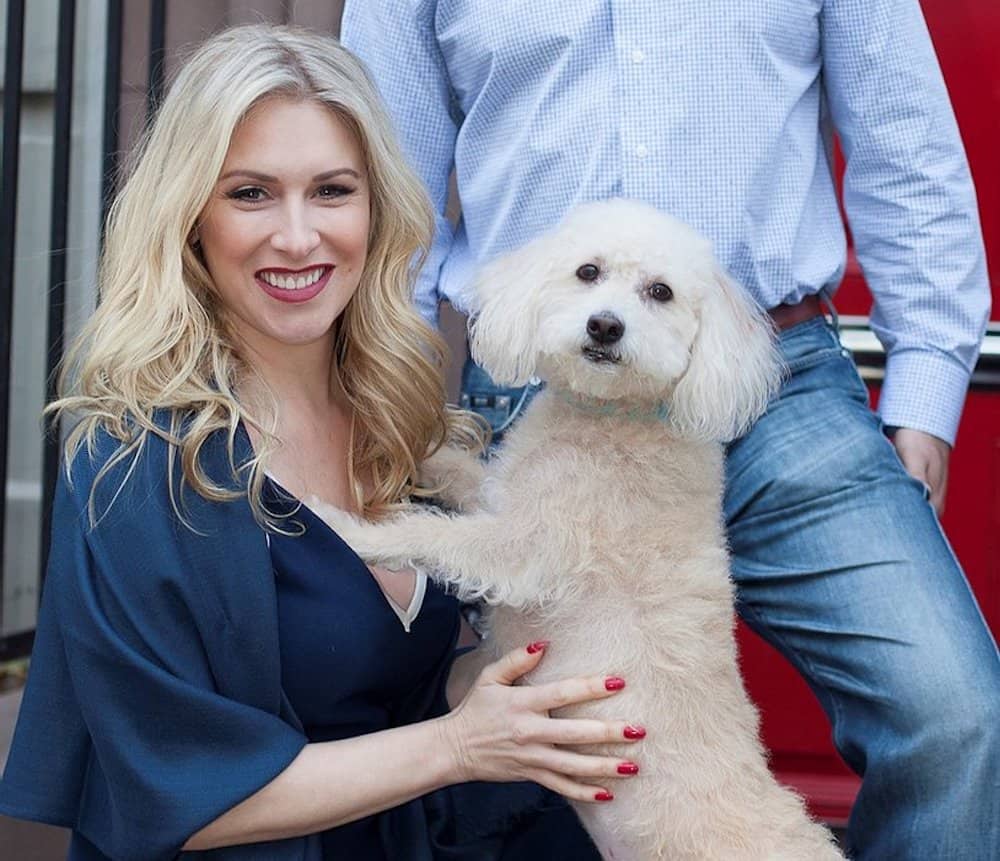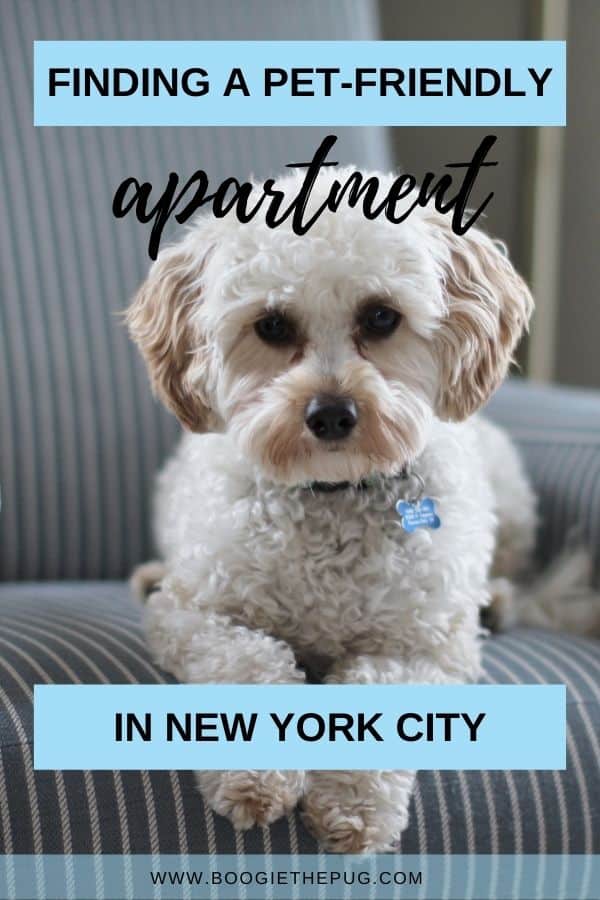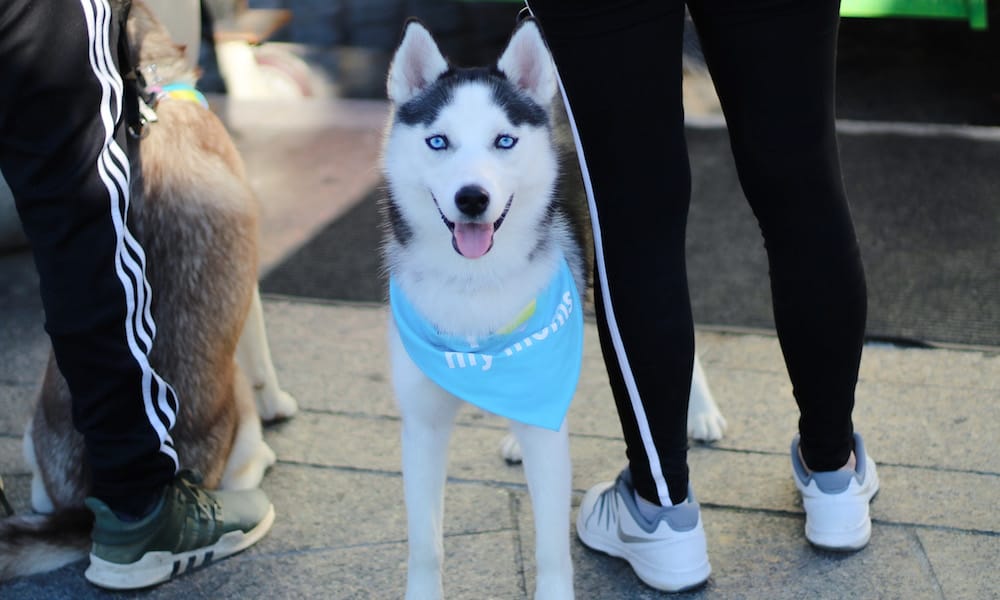Finding a Pet-Friendly Apartment in NYC: Tips from a Broker
Looking for a new home to rent or buy can be stressful, and add in a furry friend or two and the process is bound to get even tougher. There are so many things to think about: location, residence type and amenities, and budget are just a few of the factors to consider in your decision making. Initially keeping as many options on the table as possible, you’re ultimately looking to narrow down those choices until you find the perfect abode for you and your pup.
We talked to colleagues, interviewed a NYC real estate broker, and included our personal experience as board members of a real New York co-op to bring you this ultimate guide to finding pet-friendly rentals in New York City.
New York City Pet Law
There’s a pet law? There sure is.
Established in 1983, the New York City pet law states that residents living in buildings with more than three units may keep a pet in a no-pet building if that animal has been kept “openly and notoriously” for three months or more.
It also applies to condominium owners in Brooklyn, Queens and Staten Island, but not to condo owners in Manhattan and the Bronx, or to those living in New York City Housing Authority (NYCHA).
The pet law was created in response to disputes between landlords and rental tenants, when landlords who had looked the other way for years were suddenly evicting people for breaking the no-pets rules.
Pets Allowed vs. Pet-Friendly
Not all residences are created equal, and while some welcome your furry friends, others are simply tolerant of them.
“Pets Allowed” are residences that allow pets, but don’t necessarily want them. They might do things like charge you extra fees, put lots of restrictions and obstacles in your way, and have strict and very specific criteria for keeping a pet.
“Pet-Friendly” residences are ones that welcome pets, and even have amenities to enhance life with your dog. These extras include doggy daycare, fewer regulations on things like breed and size, and on-site groomers and dog runs.
See if you can catch the vibe of the residence. Speak to other pet owners in the building, and get a sense of your neighbors and the landlord. Pets allowed vs pet-friendly really are two very different situations.
Choosing the right location
Each neighborhood in New York City has a different feel to it, and some might fit your lifestyle better than others.
Here are a few things to keep in mind when selecting a neighborhood for you and your furry friend:
- Proximity to a park and/or the dog park.
- Check to see if there are pet-friendly establishments, as well as veterinarians, pet stores and groomers within walking distance.
- Does the neighborhood have a lot of traffic? Some dogs are sensitive to noise levels and won’t do well in pedestrian and car heavy locations.
- If you walk your dog super early in the morning or late at night, choose a neighborhood you feel safe walking through at odd hours.
Selecting the right residence for you
New York City is diverse in both people and housing options. There are so many places to choose from, from townhouses, to brownstones, to luxury apartments and ancient walk ups.
But there’s also a lot to think about when you’re deciding on the kind of residence that fits your lifestyle, and your pet’s lifestyle too.
Some things to keep in mind are:
- If your dog’s a senior, don’t rent a place on the 5th floor of a walk up – unless you’re cool with carrying them!
- Decide if additional pet-friendly perks are important to you (and worth the extra price), like on site groomers or a private dog run.
- Do any neighbors have dogs? If your dog is triggered by barking or dog/cat smells nearby, you might not want to live on the same floor as the woman with three Great Danes.
- Are you ok if the residence makes dogs use service entrances and/or elevators?
- If your dog afraid is of loud noises don’t rent an apartment facing a busy street.
- If your dog is 180 lbs and always has the zoomies, rent a ground floor apartment so there are no downstairs neighbors to complain.
Acing a Co-op Interview when you have a pet
I live in a co-op and am on the board, so I have a bit of insight when it comes to co-op boards and what they like to ask when conducting an interview.
We’ve interviewed both potential renters and potential buyers, and the issue of pets is always a hot topic.
Just like with any community, there are a mix of personalities and viewpoints in my building. While some of my fellow neighbors own pets themselves, others don’t share the same affinity for animals. The key is finding a sweet spot where everyone feels comfortable with the situation.
Some questions my co-op board has asked potential buyers and renters are:
- Do you currently have a pet and what type of animal is it?
- How long have you owned the pet?
- Is your pet trained?
- How well does your pet get along with other animals and other people?
- Have you ever had a complaint about your pet?
- Has your pet caused any property damage at your current residence?
- Are you planning to get another pet in the upcoming months?
If the person/s does not own a pet, we ask if they plan to get one.
As a board member who was once interviewed myself, I always find it’s best to be honest, but balance out the negative with a positive.
For example:
- If your dog is a puppy, mention their age but also highlight the training program they’re in, or the hours they spend at puppy daycare every day.
- If you have a senior dog, mention their age, and whether they’re active or like to sleep all day (as many seniors do).
- If your dog is large, highlight how well trained they are, and that they don’t bark frequently.
With bad, comes good, and with every negative, comes a positive to balance things out – as long as you’re being truthful!
Before you sign on the dotted line…
Find out the following:
- What is the pet policy? And get it in writing!
- Are there any breed and/or size restrictions?
- Is there a pet fee or deposit?
- How many dogs reside in the building?
- Are there any pet-friendly perks or amenities that the building provides?
- Is there a pet limit?
Emotional Support Animals in Housing: The NYC Human Rights Law
The NYC Human Rights Law protects against disability discrimination in housing, and it includes people who rely on emotional support animals (ESA) due to a disability.
According the the NYC Human Rights Law, housing providers must permit residents to keep emotional support animals as a reasonable accommodation for a disability, unless it would cause an undue hardship to the housing provider.
That means that even if a building has a no pets policy, or restrictions against a dog’s size, weight or breed, emotional support animals are exempt, unless the exemption would cause an undue hardship to the housing provider.
It should be noted that if the person’s disability or need for an ESA is not readily apparent, the housing provider is allowed to request confirmation from a treatment provider that A. the person has a disability and B. the animal would help treat the disability. But be aware – they can not require any person to disclose the specific underlying disability or reject accommodation requests based on rigid requirements, such as requiring a specific form or type of documentation, or that the documentation be dated within a certain time of the request for accommodation.
They also can not charge any additional fees.
Advice from a NYC Real Estate Agent

Celeste la Perla Pandhi has been a real estate broker in New York City for the last six years. She’s also a mom to human twins and a fluffy white dog named Shilo. She knows the ins and outs of renting and buying in New York City, specializing in residential real estate throughout Manhattan, Brooklyn and Queens.
We polled New Yorkers from the @dogsofnyc community and gathered a bunch of questions for Celeste. We asked her about finding that perfect place to live in the city. We focused on finding an apartment that meets your budget and lifestyle, and most importantly, something that welcomes your four-legged friend.
Do you think the number of pet-friendly apartments available is growing?
The number of condos and new developments has grown and those new developments certainly tend to be more accommodating and flexible overall.
I do think that there is a great understanding of service animals and ESA animals in NYC – in general NYC is VERY pet-friendly, but there are some dogs that are deemed aggressive breeds that continue to be an issue. “Aggressive” breeds are often not allowed in prime Manhattan.
What should a pet parent know before starting the process of finding a new home?
Building rules will vary A LOT. This generally makes shopping for a new home in NYC very challenging. Pet parents should be cautious of referencing certain breeds, or even mixed breed shelter dogs. Unfortunately, when shelters guess at a dog’s pedigree, they often label them as part “XYZ,” and if that particular breed is known or thought to be aggressive, it can cause a problem. It isn’t fair, but it happens. Saying pit mix for example could mean the dog will be banned from buildings.
In general, be prepared to respond to questions about breed, weight, vaccinations and behavior. Some buildings will interview, while others ask for size and breed, and for a photo. Some buildings have a height restriction in addition to weight restrictions – these are things you can have your broker screen for ahead of time.
What can an applicant do to make their pet sound more appealing when applying to rent an apartment?
Talk to your broker ahead of time.
It’s our job to present you and your entire family, including your pet, in the best light possible. By speaking with your broker ahead of time, you can get specific guidance on how to approach a new building, while also arming your broker with positive information that they can share about you and your dog.
There are some new luxury buildings that seem to be advertising specifically to pet parents. They offer perks like private dog parks. What can you tell us about them, and do you think we’ll see more of them in the future?
Yes, this has been a big push in terms of amenities like this in new developments. And generally, these are condos that tend to be less restrictive overall. NYC loves their fur-babies, so it is good to see they are being taken into consideration with new developments.
The Fair Housing Act protects people from discrimination when they are renting (or buying!) a home, meaning landlords must accommodate tenants with emotional support animals, even if the building has a no pets policy. What more can you tell us about this?
As a broker I can’t give legal advice in terms of this legislation, but I can say that it is important if you have an ESA to make sure you have your paperwork in advance and let your broker know it is an ESA pet in advance as well!
Can you negotiate with a non pet-friendly landlord on making a rental pet-friendly?
You can offer to pay “pet rent.” As you’ve also mentioned above, emotional support animals must be accepted.
Why would a building that says they allow any size/breed still ask for that information?
This might just be part of an effort to record who (and what kind of animals) are living in the building. I am not certain, but it could also have to do with insurance…that’s a guess.
When a co-op says they approve dogs on a “case by case” basis, what are they looking for to approve?
This likely means they want to make sure the pet isn’t an aggressive breed – that would be my first thought. Also, sometimes buildings will restrict tenants to one pet per apartment.
Is there any way to negotiate an apartment listed as “no to pets” with a pet deposit?
You can no longer provide a deposit of more than one month rent for security. But they can ask for – and you can also offer by way of negotiation – pet rent.
Why is it so difficult to find an apartment that accepts pets in NY?
There are lots of pet-friendly apartments. Dogs deemed “aggressive” breeds tend to have a harder time due to “community” living. It’s a concern about risk, but often unfair to the pets. I am a big believer some dogs get a bad reputation unfairly. Large dogs may also have a harder time since many buildings have weight restrictions, but this is another reason to get help from a broker.
What is the purpose of weight limits?
This personally never makes much sense to me, but I believe it’s a risk assessment.
How do landlords define how much a pet fee should be?
This will vary. There is no industry wide formula that I am aware of.
We want a second dog but our lease says only one dog. Do large companies (TFC) actually care?
You have to speak to your landlord. The decision is at their discretion. If you go against the rules you could be in violation of your lease.
Are there any websites that give the option to search for ground floor apartments only?
Brokers can do that in the broker system. Generally speaking, websites available to the public have more limited filters.
What makes New York City different than other places when it comes to pet-friendly rentals?
NYC loves luxury and we love our fur children. We consider them a true part of our family.
Thank you so much to Celeste for answering our questions! You can follow Celeste on Instagram or check out listings on her website.
Any extra questions? Share them below.
Click here for more NYC dog tips.
Pin for later!











Thanks for this helpful article. Finding a house with pets is really not a trivial task. But what worries me, even more, is how to keep the house clean. This point has always confused me when renting a home. I have been looking for the perfect combination for a long time. I use a pressure washer to clean up dirt in the yard and living room in a timely manner. I deliberately choose the house with a lot of tiles.
Great tip! Tiles are much easier to keep clean.